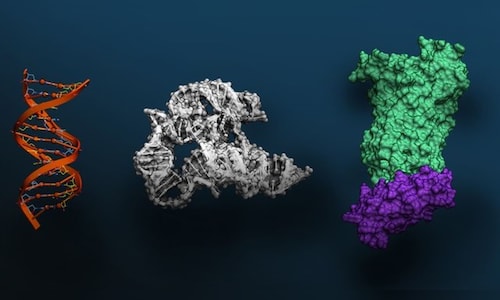In an X post, Kiran Mazumdar-Shaw, the Executive Chairperson of Biocon, wrote, “AI for Biomolecular Sciences Now Available via NVIDIA BioNeMo | NVIDIA Blog. It will revolutionise and shrink clone to clinic timeline!”
AI for Biomolecular Sciences Now Available via NVIDIA BioNeMo | NVIDIA Blog. It will revolutionise and shrink clone to clinic time line! https://t.co/F6ouBqiFv3
— Kiran Mazumdar-Shaw (@kiranshaw) February 20, 2025
The new model is available to developers across the globe on the NVIDIA
BioNeMo platform. Evo 2 was trained on the dataset of nearly 9 trillion nucleotides — the building blocks of DNA and RNA.
It can be used in biomolecular research applications such as predicting the form and function of proteins with their genetic sequence, finding novel molecules for industrial and medical uses and assessing the effects of gene mutations on their functionality.
“Evo 2 represents a major milestone for generative genomics. By advancing our understanding of these fundamental building blocks of life, we can pursue solutions in healthcare and environmental science that are unimaginable today,” said Patrick Hsu, Arc Institute cofounder and core investigator and UC Berkeley assistant professor of bioengineering.
With options to modify model parameters, users can create a range of biological sequences using the NVIDIA NIM microservice for Evo 2. Developers can download the model and refine Evo 2 on their proprietary datasets through the open-source NVIDIA BioNeMo Framework.
According to Brian Hie, assistant professor of chemical engineering at Stanford University, researchers can now more easily create biological systems with Evo 2, leading to novel and useful advancements.
“Designing new biology has traditionally been a laborious, unpredictable and artisanal process. With Evo 2, we make the biological design of complex systems more accessible to researchers, enabling the creation of new and beneficial advances in a fraction of the time it would previously have taken,” Brian Hie said.
The new model can shed light on proteins, RNA and DNA. Evo 2, which has been trained on a diverse range of species from various domains of life, including bacteria, plants, and animals, can be used in scientific domains like materials science, healthcare and agricultural biotechnology. Lengthy genetic information sequences, up to one million tokens, can be processed by Evo 2’s novel model design.


